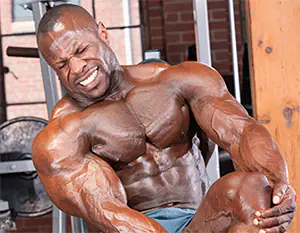If you talk to athletes of different levels of training: beginners or experienced - it doesn’t matter - then one pattern is clearly visible: the higher the athlete’s level, the more likely it is that you will find symptoms of muscle fatigue. After all, the desire to win and set records forces you to carry out grueling training, which sooner or later leads to the most common “sports disease” in bodybuilding – overtraining. An athlete who has reached a decent level constantly walks the line between high-quality training intensity combined with optimal volume, and muscle overstrain or overtraining syndrome.
Muscle strain is an emotional, physical and behavioral condition that occurs when the volume and intensity of an exercise program exceeds the body's recovery capabilities. You should know that bodybuilding is a specific sport. In which “a lot” does not always mean good. But just the opposite - excessive zeal to quickly increase the working weights of weights and an unreasonable increase in the intensity of training lead to severe tension in the muscles. Very strong. Well, muscle tissue is not a dimensionless resource - there is a limit to everything. Fiber can lift a certain amount of weight in a certain amount of time. If training is regular and the muscles have time to rest to restore glycogen and increase in volume, the athlete will be able to lift more weight. Or the same weight, but more times. If, however, well-planned performance of certain exercises is supported by proper nutrition and special sports supplements, then this all together is called bodybuilding.
But if you remove or shorten any point from this system, then nothing will work. Without proper nutrition, nothing will happen. Without the right training program, nothing will happen. But without rest and recovery, it will happen. Very tired and overtrained. And there will also be injury. Do not doubt. If you swing every day 2 times, then get ready - you will break very soon. Most likely it will be the chest. The strength of this large muscle group is deceptive. And when they are under constant high tension, believe me, there will be trouble.
In other words, muscle strain syndrome is an imbalance (equilibrium) between training and rest (recovery). This is a complex of several responses of our body to the excessive excessive load that the body receives in the gym. As a rule, all this happens during intense preparation for some competition, or when the bodybuilder leaves very little time for his muscles to recover.
Despite the fact that they are very tired, many athletes continue to train intensively, gathering all their will into a fist. But in vain. This is how excessive tension in muscle fibers occurs. This can also happen if an athlete has been sick and immediately begins high-intensity training upon recovery. Nutrition plays a very important role here. Most often, muscles are overstrained in those athletes who have a low-calorie diet and few vitamins, and whose daily food contains a lot of simple carbohydrates.
When muscle fibers are strained beyond measure, the functioning of the immune system is disrupted. The athlete often begins to suffer from various infectious diseases. And problems begin to arise in the musculoskeletal system: the elasticity of the ligaments and the elasticity of muscle fibers decrease. Antagonist muscles begin to function incorrectly. Coordination of movements, attention are impaired, and defensive reactions worsen. And this is the first path to injury.
Due to the fact that muscle fibers are not fully restored, the athlete experiences a constant feeling of fatigue. As a rule, this feeling is accompanied by painful sensations. During training, you have to put in much more effort to complete the exercise. Sleep becomes shallow and restless.
If this happens to you, no matter what you do: fitness, bodybuilding or powerlifting (here we are only talking about “iron” sports), then this is definitely overexertion.
- reduce training volume;
- devote more time to sleep (ideally 10 hours a day);
- ensure that the nutrition is complete;
- you should take a break from training for a few days;
- sports or muscle massage;
- thermo- and cryotherapy;
- innovative special products such as tourmaline (for example, bracelets, cuffs, headbands or belts);
- adaptogens.
Remember: the sooner you respond to the symptoms listed above, the better. After all, recovery will have to spend quite a lot of time. Your body itself will tell you that it has rested and recovered. You just have to be able to listen to him carefully.
Post Views: 115


